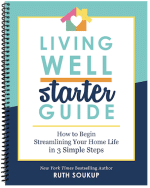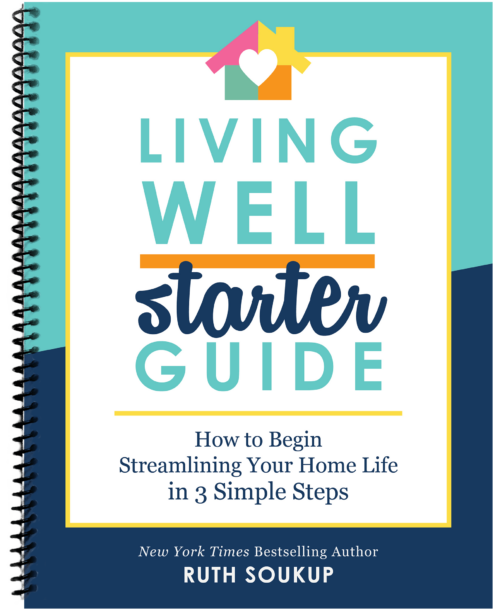Stress. It’s all around us. Sometimes it can feel like we’re being crushed by the weight of a giant, stressful life-boulder. You can’t breathe, you can’t think, and there’s a horrible sense of impending doom.
Or maybe that’s just me?
But I’m guessing not. In fact, I’m pretty we’ve all felt stressed and overwhelmed at some point. Most of us probably feel stressed out at least once a week. Between obligations at work and at home, with our kids and our spouse, at church and at school, there’s a lot on our plates. Sometimes it can be hard to cope. We feel inadequate and strive for perfection. And we put a LOT of pressure on ourselves!
There are physical signs your stress level is approaching overload. Maybe you’ve had a series of colds and flu bugs you just can’t seem to shake. Perhaps you’ve lost or gained weight, aren’t sleeping well, or you feel like a fountain of emotions all the time. Unfortunately, some of us react to stress by getting snippy with our kids, our spouse, and those around us, saying things we later regret, and thus adding MORE stress to our load.
If any of these things sound like you, then it’s time to get your stress under control! If you’re so overwhelmed you’re displaying signs of depression or anxiety, then it might be time to talk to a professional. If it’s just your garden-variety stress most of us experience frequently, then there are a few coping techniques you can adopt to reduce stress now.

1. Assess Your Stress
First of all, explore what seems to be making you feel “stressed out.” Is there an event on the horizon you’re dreading? Is there an underlying issue in your marriage or in your relationship with your kids you need to address?
Stress can be caused by issues of any size or type. Maybe there’s a big family wedding coming up, maybe you’re the “Cookie Mom” this year and it’s more work than you expected, maybe you’re worried about tax season on the horizon, or perhaps there are other financial worries you need to take care of. Any of these events or issues can be triggers for a stretched-too-thin feeling. Sometimes stress can be the “canary in the coalmine,” indicating we have life concerns we need to address now.
Simply articulating the problem and acknowledging it can lessen its power. You can even allow yourself to spin a ridiculous what-if/worst-case scenario like, “I’m not going to do well at the PTO fundraiser. The other parents will judge me harshly. My child’s school won’t have enough money for their events in the future. Everyone will hate us, they’ll kick us out of the school, my kids will end up never getting into a good college, and their lives will be ruined!”
This exercise allows us to realize that most things aren’t a matter of life or death. It can help you gain perspective (and even laugh), making your immediate situation seem much less dire.

2. Make a List
One of the ways I deal with stress is by making lists. When I feel like I can’t get a handle on all the things I need to do, I often worry I’m going to miss something. Making a list helps me feel in control and ensures I won’t forget anything.
You can make lists using your phone, on your computer, or just by grabbing an old fashioned pen and paper. Simply jot down what you need to do or remember, then take a look at it. Sometimes when you see it in black and white, it seems much less daunting.
Planning ahead helps ease stressful events and times of year, like the holidays. Not only does an organized list help you feel more in control, but it can also help you prioritize and enjoy the satisfaction and feelings of accomplishment by crossing those little tasks off!
3. Take Five
When my kids were going through their fighting and tantrum phase, I realized sometimes you just need time to cool off. We’ve applied this rule to our family discussions and arguments as well, and it can definitely be used in those moments when it all feels like too much.
Set a timer or look at the clock, and allow yourself to simply take a five-minute break. It can seem counterintuitive at first—why take five minutes to sit and chill out, when you could be getting something done? But in truth, taking those five minutes to calm down and regroup can help you clear your head, get your emotions in check, and be ready to tackle issues with a better frame of mind.

4. Breathe
Deep breathing doesn’t have to be dramatic—and you don’t have to take yoga or meditation lessons to do it. Simply close your eyes and take a deep breath in through your nose to the count of four. Hold it to the count of five and let it out to the count of six. Repeat this a few times.
Quality oxygen has a calming effect on our brains and bodies. Deep breathing will help you relax, slow your heart rate, and allow you to focus on the tasks at hand. If you’re ready to take it to the next level, try aromatherapy with essential oils. The calming effects of oils can do amazing things for your mood.
5. Drink
Wine. No, no, I’m kidding!! Drinking a glass of cold water or sipping hot water or tea is a proven way to quell anxiety. As you take a drink, really concentrate on the sensory elements involved: think about the cool sensation of the water filling your mouth, or the feeling of the warm liquid going down your throat.
When you can refocus your senses from “fight or flight mode” to something more soothing, whether it’s the feelings of drinking hot and cold liquid or a soothing scent (like lavender), your brain stops panicking.
The other important thing about drinking water is it helps you stay hydrated. Dehydration can exacerbate feelings of hunger, exhaustion—and yes, being stressed out. Water is truly nature’s miracle elixir, so allow it to help you keep your body healthy and balanced.

6. Compliment Yourself
Using positive self-talk seems a little, well, hokey at first. However, positive self-talk has a hugely positive effect on your mood. Plus, it boosts your coping skills. Telling yourself you can handle this, you’re in control, and you’re doing great are all great ways to help yourself deal.
Reciting positive mantras and messages is a technique advised by self-help gurus and in meditation practices. We’ve all heard of putting a sticky note with a positive message on our mirror or doing the “Stuart Smalley: I’m good enough, I’m smart enough…” exercise. Hey, while it’s the fodder of SNL sketches, there’s a lot of truth to the effects of positive self-talk.
7. Be Grateful/Reframe Your Thinking
When the furnace goes out, or when you’re late for dropping off at soccer practice because the car won’t start, it can be hard to feel grateful. It can be hard to feel anything but ticked off and frustrated. This is when you have to take a moment and let Grace take over.
If you truly believe everything happens for a reason, you can reframe your thinking to help you extract the positive out of any situation. What are you supposed to learn from this challenge? Remember: God won’t give you anything you can’t handle. If you feel overwhelmed, then it’s time to give it over to God and ask for understanding.
In the Bible, it always says, “And then it came to pass…” It never says, “And it came to stay…” Just remember all things are temporary, and you will get through this. Give God thanks for sending you a challenge He knew you could handle and have faith you can do it!

8. Savor
Just like taking that long drink of water or tea, savoring a bit of chocolate, fruit, cheese or something else you find delicious can reset your stress. It’s not about eating to forget your feelings or using food as an escape. It’s about taking the time to enjoy something that brings you pleasure and joy.
If chocolate’s your favorite thing, then take a single cookie or a piece of good quality chocolate, slowly unwrap it and allow yourself to experience the scent, look at the texture, and really focus on the treat. Next, pop it in your mouth or take a small bite, and slowly chew and savor the experience.
9. Move
I’m not telling you to pack up your house and run away! Simply get up from your chair and take a little walk. If you’re in a stressful situation, getting some fresh air and getting your blood pumping will help you feel calmer. Similarly, if you’re working away and stressing out, you probably could use a little time to refocus. Go for a quick walk around the block or even just around your office.
Exercise is one of the best mood regulators. It can help beat feelings of depression and anxiety. It releases endorphins and helps you feel calmer and happier. You don’t have to be a gym-rat, either. Even 10-minute exercise sessions a couple times a day can help you get the effects without taking over your schedule. Move more to beat stress.

10. Cancel an Obligation
You can’t run away from stress and procrastination won’t make things better. But if there’s something you can get off your plate for the time being, give yourself permission to cancel guilt-free.
So many times we say yes to things: volunteer meetings, taking a meal to a neighbor, leading the food drive, the coat drive, the Girl Scout cookie sales, and taking up the extra slack at work. Give yourself some leeway to keep your hand down the next time there’s a call to action. No one can do it all and it’s okay to say no sometimes.
Practice the art of the graceful decline: “I’d love to help, but right now is just not a good time.” Put the phrase into use. It’s amazing how freeing it is to forgo making up excuses, and simply just say no.
11. Sleep
Sleep can play a huge factor in our coping mechanisms. Getting rest is vital to our health and well-being. If you’re getting eight hours a night, you’ll feel more prepared to deal with the curve balls life throws your way. Even missing an hour or two of rest can leave you feeling nervous, raw, and on edge—and caffeine only enhances those feelings, rather than counteracting them.
Instead, put away your phone or your iPad, and turn off the television. If your brain is running through all of the stressors of the day, grab a notepad and jot them down. Once they’re on paper, tell yourself you’ll revisit them in the morning, and catch some ZZZs. You’ll wake up refreshed and more able to cope with the problems at hand.

12. Laugh
Laughter really is the best medicine. When you feel stressed out, give yourself the gift of joy. Enjoy a funny YouTube video or a joke, or simply text a friend. Smiling and laughing can help put things in perspective, even if things are very serious. Humor is a great way to cope and find contentment, even (and especially) in times of darkness.
Life goes on. No matter what you’re facing and what’s stressing you out, keep in mind all the amazing ways you’ve overcome issues in the past and the way time softens things. No matter how bad things might seem, or no matter how stressed you might feel right now, this season that you’re in won’t last forever. Make an effort to smile (even when you don’t feel like it), to enjoy the small moments, and remind yourself it’s not the end of the world.

TAKE BACK CONTROL OF YOUR HOME LIFE
 Ever feel like you just can't keep up? Our Living Well Starter Guide will show you how to start streamlining your life in just 3 simple steps. It's a game changer--get it free for a limited time!
Ever feel like you just can't keep up? Our Living Well Starter Guide will show you how to start streamlining your life in just 3 simple steps. It's a game changer--get it free for a limited time!
If you love this resource, be sure to check out our digital library of helpful tools and resources for cleaning faster, taking control of your budget, organizing your schedule, and getting food on the table easier than ever before.











Wonderful post Ruth. Well written! Being inpatient is the only reason why we stresses out. We need solution for every problems that occur to satisfy our thoughts. Unfortunately, some solution are not instant. Be patient and positive, I always believe of there is always a solution for every problems.
I’ve been looking for online suggestions to help me with my stress and anxiety and at the right time I found your article which helped me to keep me cool. Thanks.